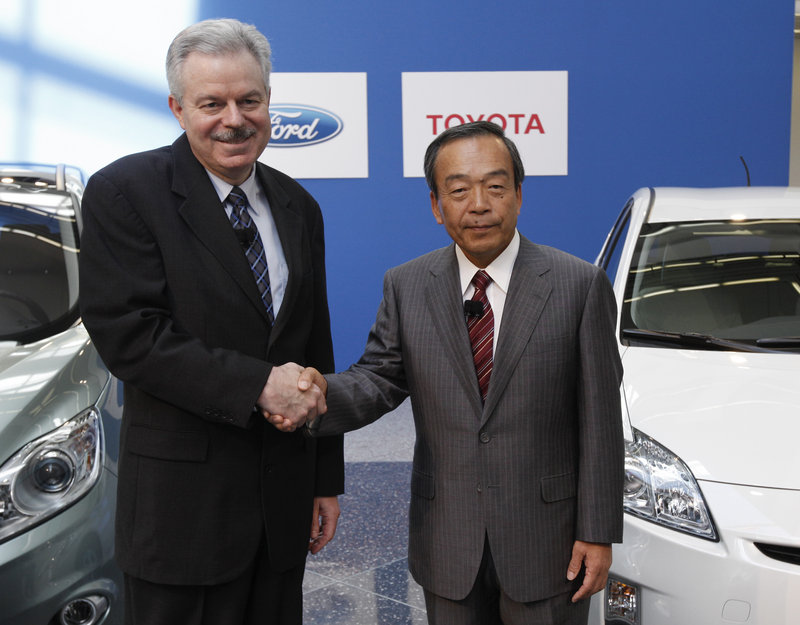DEARBORN, Mich. — A chance meeting in an airport lobby between the top executives of Ford Motor Co. and Toyota Motor Corp. has evolved into a deal between the auto giants to jointly develop a gas-electric hybrid engine for pickup trucks and sport utility vehicles.
The companies signed the agreement Monday to share development costs, saying they want to make the technology more affordable for customers and bring it to market faster. Many details have yet to be worked out, but both said their vehicles would remain unique even if they share the same drive systems.
The deal will help both companies meet more stringent fuel economy and pollution standards in the U.S. and elsewhere, while at the same time keeping larger vehicles viable if gas prices continue to rise.
NEW U.S. STANDARDS TO MEET
“Trucks and SUVs are indispensable for the U.S. society,” said Takeshi Uchiyamada, Toyota’s executive vice president for research and development.
The companies aren’t sure yet what kind of gas mileage the system will get, but they know that hybrid trucks would help automakers meet U.S. fuel economy standards that require new vehicles to average 56.5 mpg by 2025. Trucks will have lower mileage targets, but still would have to improve to meet the standards.
Neither company would say what vehicles the system would go into, but it was clear they are targeting pickup trucks, which for both are big sellers. Ford’s F-Series pickup is the top-selling vehicle in the U.S., and Toyota is still trying to break into the full-sized pickup market with its Tundra model.
Shares of Ford rose 5 cents to $10.04 in afternoon trading, while U.S. shares of Toyota were down 24 cents to $70.46.
TRUCKS TO REMAIN DISTINCTIVE
Both companies now sell thousands of hybrid cars and trucks worldwide, with Toyota’s Prius the world leader in hybrid sales. But they’ll have to develop a different system with enough power to haul and tow heavy loads.
Derrick Kuzak, Ford’s product development chief, said that although the trucks could have the same engine and transmission, each will be different.
“What makes them uniquely a Ford truck will continue to be there, with a hybrid powertrain that we co-develop with Toyota,” he said.
Currently, the F-150 with a six-cylinder turbocharged engine gets an estimated 16 mpg in the city and 22 on the highway, while a six-cylinder Tundra gets 16 in the city and 20 on the freeway. Both will have to improve if gas prices keep rising and as government fuel economy standards increase.
Kuzak said Ford expects that 10 percent to 20 percent of Ford’s vehicles will have hybrid or electric powertrains by 2020. “This is just a reflection of that plan,” he said.
WORK ON ELECTRONICS STANDARDS
It will take a year for the companies to figure out who will do what research, Kuzak said. After that, they would sign a definitive agreement that would lay out timelines to develop the technology, he said. It will take at least two or three years after that to develop a system, and the companies hope to bring it to market this decade.
The system also would be used in rear-wheel-drive sport utility vehicles, the companies said.
Ford and Toyota also said they will work together to develop standards for the way electronic devices such as smartphones link to cars and trucks. But they would each retain their own touch screens and would have unique systems on their dashboards, he said.
Ford said this is the first time it has worked jointly with Toyota on any project. The company licensed technology from Toyota when it introduced a hybrid system in the Ford Escape SUV in 2004, but now all its hybrids run on technology developed by Ford, Kuzak said.
Ford and Toyota would save money and time on the cost of developing the hybrids, bringing them to market at a much lower cost and faster than either company could do alone, Kuzak said.
Send questions/comments to the editors.



Success. Please wait for the page to reload. If the page does not reload within 5 seconds, please refresh the page.
Enter your email and password to access comments.
Hi, to comment on stories you must . This profile is in addition to your subscription and website login.
Already have a commenting profile? .
Invalid username/password.
Please check your email to confirm and complete your registration.
Only subscribers are eligible to post comments. Please subscribe or login first for digital access. Here’s why.
Use the form below to reset your password. When you've submitted your account email, we will send an email with a reset code.